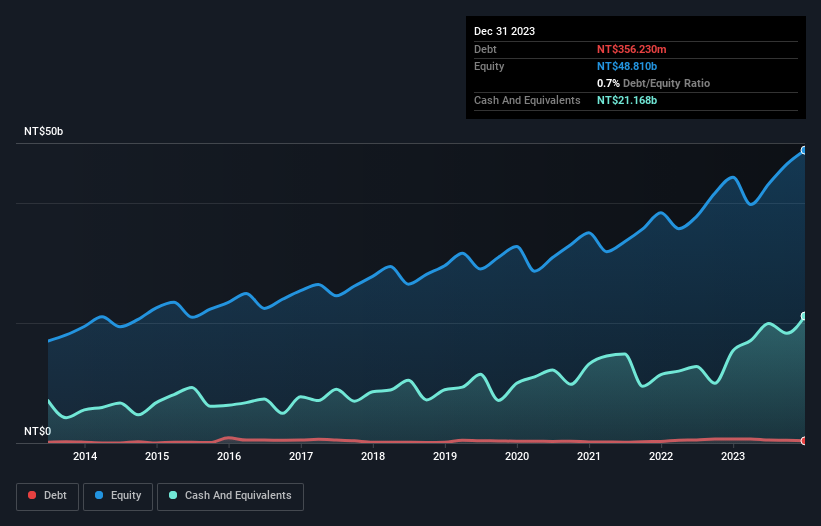Stock Analysis

Howard Marks put it nicely when he said that, rather than worrying about share price volatility, 'The possibility of permanent loss is the risk I worry about... and every practical investor I know worries about.' So it might be obvious that you need to consider debt, when you think about how risky any given stock is, because too much debt can sink a company. We can see that Advantech Co., Ltd. (TWSE:2395) does use debt in its business. But should shareholders be worried about its use of debt?
What Risk Does Debt Bring?
Debt and other liabilities become risky for a business when it cannot easily fulfill those obligations, either with free cash flow or by raising capital at an attractive price. If things get really bad, the lenders can take control of the business. However, a more usual (but still expensive) situation is where a company must dilute shareholders at a cheap share price simply to get debt under control. Of course, plenty of companies use debt to fund growth, without any negative consequences. When we think about a company's use of debt, we first look at cash and debt together.
See our latest analysis for Advantech
What Is Advantech's Debt?
The image below, which you can click on for greater detail, shows that Advantech had debt of NT$356.2m at the end of December 2023, a reduction from NT$652.8m over a year. But on the other hand it also has NT$21.2b in cash, leading to a NT$20.8b net cash position.

A Look At Advantech's Liabilities
We can see from the most recent balance sheet that Advantech had liabilities of NT$16.0b falling due within a year, and liabilities of NT$4.22b due beyond that. On the other hand, it had cash of NT$21.2b and NT$9.35b worth of receivables due within a year. So it can boast NT$10.3b more liquid assets than total liabilities.
This short term liquidity is a sign that Advantech could probably pay off its debt with ease, as its balance sheet is far from stretched. Simply put, the fact that Advantech has more cash than debt is arguably a good indication that it can manage its debt safely.
On the other hand, Advantech saw its EBIT drop by 3.2% in the last twelve months. That sort of decline, if sustained, will obviously make debt harder to handle. There's no doubt that we learn most about debt from the balance sheet. But it is future earnings, more than anything, that will determine Advantech's ability to maintain a healthy balance sheet going forward. So if you want to see what the professionals think, you might find this free report on analyst profit forecasts to be interesting.
Finally, while the tax-man may adore accounting profits, lenders only accept cold hard cash. Advantech may have net cash on the balance sheet, but it is still interesting to look at how well the business converts its earnings before interest and tax (EBIT) to free cash flow, because that will influence both its need for, and its capacity to manage debt. Over the most recent three years, Advantech recorded free cash flow worth 76% of its EBIT, which is around normal, given free cash flow excludes interest and tax. This cold hard cash means it can reduce its debt when it wants to.
Summing Up
While it is always sensible to investigate a company's debt, in this case Advantech has NT$20.8b in net cash and a decent-looking balance sheet. The cherry on top was that in converted 76% of that EBIT to free cash flow, bringing in NT$8.4b. So is Advantech's debt a risk? It doesn't seem so to us. When analysing debt levels, the balance sheet is the obvious place to start. However, not all investment risk resides within the balance sheet - far from it. We've identified 1 warning sign with Advantech , and understanding them should be part of your investment process.
At the end of the day, it's often better to focus on companies that are free from net debt. You can access our special list of such companies (all with a track record of profit growth). It's free.
Valuation is complex, but we're helping make it simple.
Find out whether Advantech is potentially over or undervalued by checking out our comprehensive analysis, which includes fair value estimates, risks and warnings, dividends, insider transactions and financial health.
View the Free AnalysisHave feedback on this article? Concerned about the content? Get in touch with us directly. Alternatively, email editorial-team (at) simplywallst.com.
This article by Simply Wall St is general in nature. We provide commentary based on historical data and analyst forecasts only using an unbiased methodology and our articles are not intended to be financial advice. It does not constitute a recommendation to buy or sell any stock, and does not take account of your objectives, or your financial situation. We aim to bring you long-term focused analysis driven by fundamental data. Note that our analysis may not factor in the latest price-sensitive company announcements or qualitative material. Simply Wall St has no position in any stocks mentioned.
About TWSE:2395
Advantech
Advantech Co., Ltd. manufactures and sells embedded computing boards, industrial automation products, and applied and industrial computers.
Flawless balance sheet established dividend payer.

